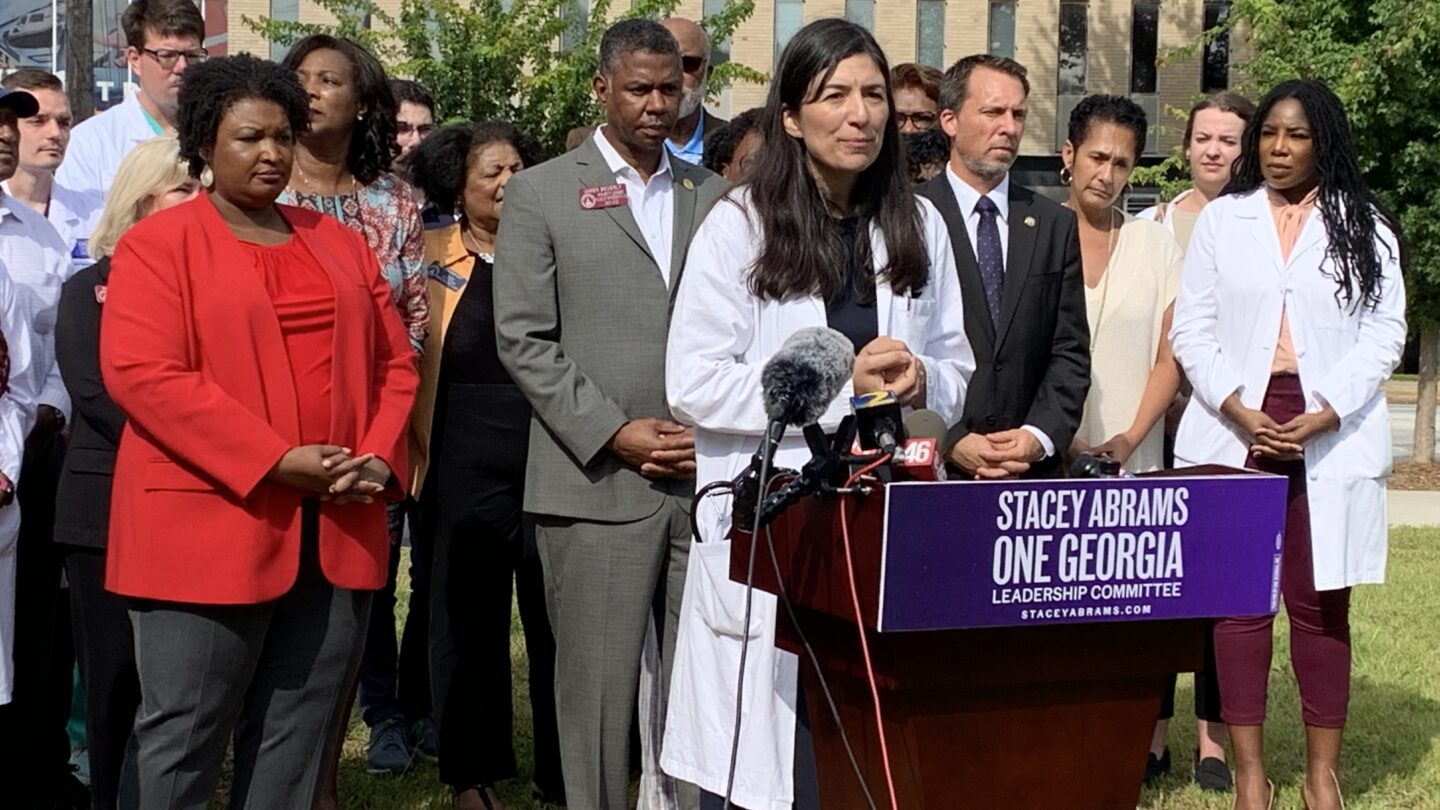A growing coalition of local, state and federal Democratic officials in Georgia is demanding answers from Wellstar Health System about its plans to close Atlanta Medical Center.
Wellstar announced earlier this week the century-old Old Fourth Ward hospital will shut down November 1, 2022 and gradually wind down operations leading up to that date.
Like nearby Grady Memorial Hospital, the nearly 500-bed Atlanta Medical Center is a so-called safety net hospital, serving a high population of low-income patients, who may be uninsured or underinsured, regardless of their ability to pay.
Atlanta Congresswoman Nikema Williams’ district includes the hospital. She said it’s critical the Level I trauma center remains open.
“Because what we see right now is the beds are currently full at Grady Hospital. And so if something happens on the interstate right here on I-75, I-85, where are they going to go if these beds are closed? Is there anything that can be done to keep this hospital serving as a Level I trauma center for this region? And then we can explore other options if everything else has been explored,” she said.
“But we have not yet even had those conversations yet with Wellstar.”
Atlanta Medical Center also includes a stroke center, a labor and delivery unit and a Level III neonatal ICU.
Wellstar released a statement saying it’s sustained operating losses at AMC including “$107 million in losses in just the last 12 months, amid decreasing revenue and increasing costs for staff and supplies due to soaring inflation.”
“The pandemic and the intense financial headwinds straining healthcare organizations right now have only made matters worse at AMC,” the statement continues.
Williams and other lawmakers spoke Friday at a campaign event for gubernatorial candidate Stacey Abrams, who is continuing to call on Gov. Brian Kemp to fully expand Medicaid under the Affordable Care Act.
Kemp’s campaign has said Medicaid expansion would not have saved the hospital from closing.
In a statement, his office also said, “the governor shares the concerns of the community on the impact this will have. Other local hospitals and healthcare providers are in active talks on how this closure will shift their needs and services. As they work to make the appropriate adjustments, Gov. Kemp will continue to build on the policy innovations introduced over the past four years that have grown access to quality healthcare while bringing down costs for Georgians across the state.”
But health advocates, including Dr. Melanie Thompson, an Atlanta Internal Medicine physician and HIV/AIDS researcher, say other area hospitals are already at capacity.
“The collapse of this hospital will shift the burden to all of the other hospitals. And if you or your mother has a stroke and that ambulance is turned away from Piedmont and Emory and Grady while the minutes tick away, where would you go?” she said. “These hospitals are full and overflowing and this preventable closure will stress them to the tipping point.”
There are roughly 200,000 uninsured people living in Fulton and DeKalb Counties alone.
Full Medicaid expansion would cover at least 75,000 more people in the two counties and funnel millions of dollars into supporting safety net hospitals, said Laura Colbert, executive director of the health policy organization Georgians for a Healthy Future.
“Grady does amazing work but there are only so many doctors and so many patient rooms and so many resources that they have, and they need support in providing care for this community as well,” Colbert said.
Wellstar also recently closed its ER at Atlanta Medical Center South in East Point.
But Medicaid expansion is not the only factor contributing to hospital closures around the country and the state.
“We’re also seeing a trend of bigger hospital systems buying up smaller hospitals and then closing the ones that are not profitable, and what that does is, it widens the access-to-care gaps between communities that already don’t have access to care, usually low-income communities and communities of color, and the folks that have enough access to care,” Cobert said. “And that’s usually higher-income communities and whiter communities.”
In a letter sent Friday to Wellstar CEO Candice Saunders, Sen. Raphael Warnock asked the health company to “reverse course.”
“At minimum, you must delay this decision until there is a plan in place, in consultation with the City of Atlanta and neighboring hospitals, to absorb these patients. We also request an immediate briefing from Wellstar that details the company’s decision-making process and its plans for mitigating the consequences of any closure on the community, the local economy, and hospital workers. Communities need access to quality health care to survive, and we have no doubt that the closure of AMC will have direct consequences on the lives of people in Atlanta,” Warnock’s letter reads.
It’s also signed by Sen. Jon Ossoff, U.S. Representatives Nikema Williams, Lucy McBath and Hank Johnson.









